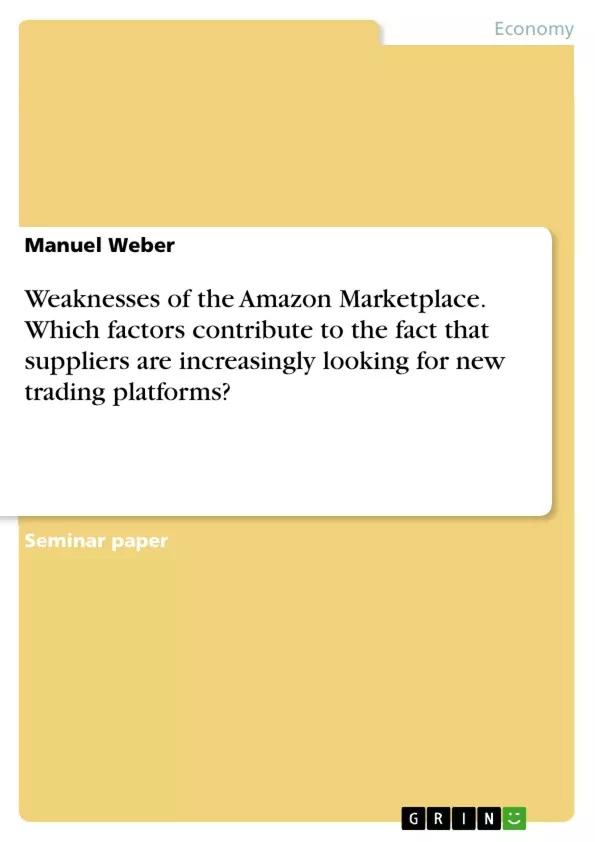The aim of this research was to identify the reasons that lead Amazon sellers to move away from the marketplace and look for alternative opportunities. Derived from this, the research question arises: Which factors contribute to the fact that suppliers are increasingly looking for new trading platforms as an alternative to the Amazon marketplace? With the help of a literature research of theory and practical context, hypotheses were developed, which were examined by means of an expert interview.
Amazon is one of the largest companies in this age. With its marketplace, Amazon can generate the greatest reach in order to reach customers. The problem that retailers currently have to deal with are on the one hand the extremely high fees that you have to pay to Amazon in order to be listed on the market at all and on the other hand the customer-friendly and retailer-unfriendly service from Amazon, especially for complaints and returns, is increasingly no longer acceptable for many retailers. This means that many retailers have to look for alternative sales opportunities in order to remain competitive. However, it is extremely difficult to create such a "simple" and customer-friendly online shop as Amazon or to find an alternative with the same large reach as Amazon.
Table of Contents
- Abstract
- Introduction & background
- Theoretical Background & Hypotheses Development
- Method
- Results
- Discussion
- Bibliography
Objectives and Key Themes
This research aims to uncover the reasons behind Amazon sellers' decision to seek alternative selling platforms instead of relying solely on the Amazon marketplace. The study delves into the factors that drive suppliers to explore new trading opportunities.
- Amazon seller dissatisfaction
- Alternative platform emergence
- Impact of fees and charges on seller profitability
- Customer-centric approach of Amazon
- Strategic considerations for retailers
Chapter Summaries
- Abstract: This chapter introduces the research question, methodology, and key findings. It highlights the reasons why sellers are searching for alternative platforms, emphasizing factors like customer issues, sales charges, competition, and strategic decisions.
- Introduction & background: This chapter provides context by examining the growth and dominance of Amazon as an e-commerce platform. It discusses the challenges faced by retailers on the Amazon marketplace, including high fees and customer-centric policies that can be detrimental to sellers.
- Theoretical Background & Hypotheses Development: This chapter analyzes the theoretical framework underlying Amazon's business model and marketplace operations. It examines Amazon's cost leadership strategy, its expansion into product manufacturing and logistics, and the impact of these strategies on sellers.
Keywords
The main keywords and focus topics include Amazon marketplace, Amazon seller, alternative trading platforms, fees and charges, customer service, competition, strategic decision-making, and retailer satisfaction.
Frequently Asked Questions
Why are sellers moving away from Amazon Marketplace?
Key reasons include extremely high fees and a service policy that is perceived as customer-friendly but retailer-unfriendly, especially regarding returns and complaints.
What are the main weaknesses of selling on Amazon?
Besides the costs, the intense competition and the strategic risk of Amazon expanding into the sellers' own product niches are major concerns for retailers.
Is it easy to find an alternative to Amazon?
No, it is difficult to replicate Amazon's massive reach and its seamless, customer-friendly shopping experience on other platforms or independent online shops.
How do Amazon's fees affect seller profitability?
The research examines how high listing and transaction fees can erode margins, forcing many retailers to look for more cost-effective sales channels.
What strategic decisions should retailers consider?
Retailers are increasingly adopting multi-channel strategies to reduce dependency on a single platform like Amazon and remain competitive in the long term.
- Citation du texte
- Manuel Weber (Auteur), 2021, Weaknesses of the Amazon Marketplace. Which factors contribute to the fact that suppliers are increasingly looking for new trading platforms?, Munich, GRIN Verlag, https://www.grin.com/document/1001202



